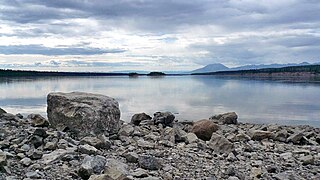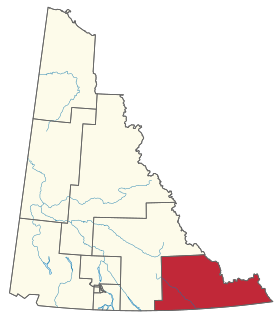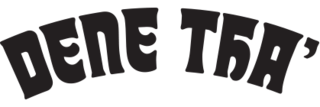External links
| Peoples | |
|---|---|
| Governments | |
| Languages | |
| Other | |
| | This First Nations in Canada-related article is a stub. You can help Wikipedia by expanding it. |
The Ross River Dena Council is a First Nation in the eastern Yukon Territory in Canada. Its main centre is in Ross River, Yukon at the junction of the Campbell Highway and the Canol Road, near the confluence of the Pelly River and the Ross River. The language originally spoken by the people of this First Nation was mainly Kaska, although a number of the First Nation's citizens are Slavey speakers. The First Nation, which has 483 registered members, is a member of the Kaska Tribal Council which is pursuing land claims in the Yukon and northern British Columbia.

Yukon is the smallest and westernmost of Canada's three territories. It also is the least populated province or territory in Canada, with a population of 35,874 people as of the 2016 Census. Whitehorse, the territorial capital, is the largest settlement in any of the three territories.

Yukon is a federal electoral district covering the entire territory of Yukon, Canada. It has been represented in the House of Commons of Canada from 1902 to 1949 and since 1953.

The Liard River of the North American boreal forest flows through Yukon, British Columbia and the Northwest Territories, Canada. Rising in the Saint Cyr Range of the Pelly Mountains in southeastern Yukon, it flows 1,115 km (693 mi) southeast through British Columbia, marking the northern end of the Rocky Mountains and then curving northeast back into Yukon and Northwest Territories, draining into the Mackenzie River at Fort Simpson, Northwest Territories. The river drains approximately 277,100 km2 (107,000 sq mi) of boreal forest and muskeg.
The Kaska language originated from the family of Athabaskan languages. Traditionally Kaska is an oral aboriginal language that is used by the Kaska Dena people. The Kaska Dene region consists of a small area in the Southwestern part of the Northwest Territories, the Southeastern part of Yukon Territory, and the Northern part of British Columbia. The communities that are in the Kaska Dene region are Fort Ware in N.W.T.; Ross River and Watson Lake in Y.T.; Dease Lake, Good Hope Lake, Lower Post, Fireside, and Muncho Lake in B.C. Kaska is made up of eight dialects, all of which have similar pronunciations and expressional terms. The town of Watson Lake was established around the period of the second World War when the Alaska Highway was first build in 1942. A major consequence of colonization was Kaska language loss. Another major cause of Kaska language loss was due to the residential school. The effect that these schools had on the Kaska language have caused a language gap between two generations resulting in few young speakers.
The Liard River First Nation, also known as the Liard First Nation is a First Nation in the southeastern Yukon in Canada. Its main centres are Upper Liard and Watson Lake along the Alaska Highway. The language originally spoken by the people of this First Nation was Kaska and the First Nation is a member of the Kaska Tribal Council which is pursuing land claims in the Yukon and northern British Columbia. Their Indian and Northern Affairs Canada band number is 502.
The Kaska or Kaska Dena are a First Nations people of the Athabaskan-speaking ethnolinguistic group living mainly in northern British Columbia and the southeastern Yukon in Canada. The Kaska language, originally spoken by the Kaska, is an Athabaskan language.

Ross River is an unincorporated community in Yukon, Canada. It lies at the junction of the Ross River and the Pelly River, along the Canol Road, not far from the Campbell Highway. Primary access to the Campbell Highway is via a nine-mile access road. Formerly it was accessed along a six-mile Canol Road section that is no longer maintained. It is serviced by Ross River Airport, used mainly for charter and scheduled flights to and from Whitehorse and Watson Lake.

Good Hope Lake is a First Nations community in northwestern British Columbia, Canada, located on Highway 37 not far south of the border with the Yukon and located east of the semi-abandoned mining town of Cassiar, British Columbia. As of the 2006 Census, there are 41 people living in Good Hope Lake, down from 75 in 2001. The band government of the Dease River First Nation is located in Good Hope Lake, and is a member government of the Kaska Tribal Council.

Watson Lake is an electoral district which returns a member to the Legislative Assembly of the Yukon Territory in Canada. The riding is one of the Yukon's eight rural ridings and is one of the oldest ridings in the Yukon.

The Dene TháFirst Nation is a First Nations government of the South Slavey in Northern Alberta, Canada. The people call themselves Dene Dháa or 'Ordinary People' in the Dene Dháh language. Its population is centered primarily in three communities: Bushe River, Meander River, and Chateh, but approximately 600 members who live off-reserve. Dene Thá First Nation is a member of the North Peace Tribal Council.

Pelly-Nisutlin is an electoral district which returns a member to the Legislative Assembly of the Yukon Territory in Canada. It was created in 2002 out of the districts of Faro and Ross River-Southern Lakes. The riding includes the communities of Teslin, Faro, Ross River, Little Salmon, and Johnsons Crossing. It encompasses the traditional territory of the Teslin Tlingit Council and the Ross River Dena Council of the Kaska Dena. Pelly-Nisutlin is bordered by the rural ridings of Mayo-Tatchun, Lake Laberge, Mount Lorne-Southern Lakes, and Watson Lake.
Faro was an electoral district that returned a member to the Legislative Assembly of the Yukon Territory in Canada between 1978 and 2002. It was created out of the riding of Pelly River and encompassed the community of Faro. It was situated on the traditional territory of the Ross River Dena Council of the Kaska Dena.

The history of Yukon covers the period from the arrival of Paleo-Indians through the Beringia land bridge approximately 20,000 years ago. In the 18th century, Russian explorers began to trade with the First Nations people along the Alaskan coast, and later established trade networks extending into Yukon. By the 19th century, traders from the Hudson's Bay Company were also active in the region. The region was administered as a part of the North-Western Territory until 1870, when the United Kingdom transferred the territory to Canada and it became the North-West Territories.
Kaska may refer to:
The Big Salmon River flows through the traditional territories of Teslin Tlingit, the Kaska Dena, and the Little Salmon Carmacks First Nations. This Big Salmon River is a tributary of the Yukon River The encampment of Big Salmon Village lies at the confluence of the Big Salmon and Yukon Rivers.
The Kaska Dena Council is a tribal council formed of five band governments of the Kaska Dena people in northern British Columbia, Yukon Territory, and Northwest Territories, Canada.
Kaska Nation is a tribal council of First Nations in northern British Columbia, southern Yukon, and the southwestern Northwest Territories in Canada.
Dave Porter is a former Canadian politician, who served in the Legislative Assembly of Yukon from 1982 to 1989. He was a member of the Yukon New Democratic Party.

The Indigenous peoples of Yukon are ethnic groups who, prior to European contact, occupied the former countries now collectively known as Yukon. While most First Nations in the Canadian territory are a part of the wider Dene Nation, there are Tlingit and Métis nations that blend into the wider spectrum of indigeneity across Canada. Traditionally hunter-gatherers, indigenous peoples and their associated nations retain close connections to the land, the rivers and the seasons of their respective countries or homelands. Their histories are recorded and passed down the generations through oral traditions. European contact and invasion brought many changes to the native cultures of Yukon including land loss and non-traditional governance and education. However, indigenous people in Yukon continue to foster their connections with the land in seasonal wage labour such as fishing and trapping. Today, indigenous groups aim to maintain and develop indigenous languages, traditional or culturally-appropriate forms of education, cultures, spiritualities and indigenous rights.
Tatchun was an electoral district which returned an MLA to the Legislative Assembly of the Yukon Territory in Canada. It was created in 1978 out of the ridings of Klondike and Pelly River. It was abolished in 1992 when it was amalgamated with the riding of Mayo to form the riding of Mayo-Tatchun.